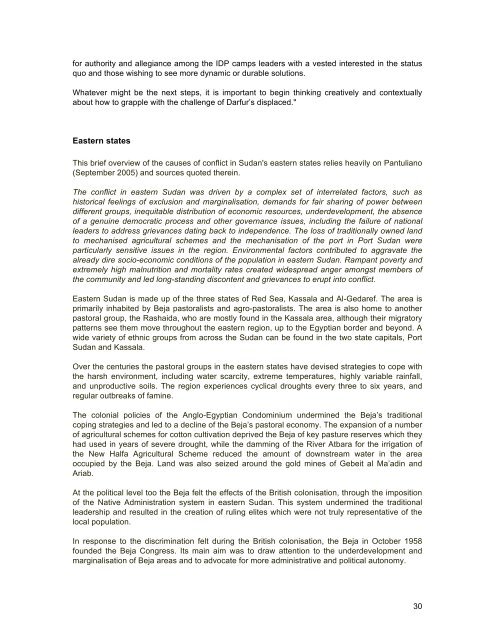SUDAN: Durable solutions elusive as southern IDPs return and ...
SUDAN: Durable solutions elusive as southern IDPs return and ...
SUDAN: Durable solutions elusive as southern IDPs return and ...
You also want an ePaper? Increase the reach of your titles
YUMPU automatically turns print PDFs into web optimized ePapers that Google loves.
for authority <strong>and</strong> allegiance among the IDP camps leaders with a vested interested in the status<br />
quo <strong>and</strong> those wishing to see more dynamic or durable <strong>solutions</strong>.<br />
Whatever might be the next steps, it is important to begin thinking creatively <strong>and</strong> contextually<br />
about how to grapple with the challenge of Darfur’s displaced."<br />
E<strong>as</strong>tern states<br />
This brief overview of the causes of conflict in Sudan's e<strong>as</strong>tern states relies heavily on Pantuliano<br />
(September 2005) <strong>and</strong> sources quoted therein.<br />
The conflict in e<strong>as</strong>tern Sudan w<strong>as</strong> driven by a complex set of interrelated factors, such <strong>as</strong><br />
historical feelings of exclusion <strong>and</strong> marginalisation, dem<strong>and</strong>s for fair sharing of power between<br />
different groups, inequitable distribution of economic resources, underdevelopment, the absence<br />
of a genuine democratic process <strong>and</strong> other governance issues, including the failure of national<br />
leaders to address grievances dating back to independence. The loss of traditionally owned l<strong>and</strong><br />
to mechanised agricultural schemes <strong>and</strong> the mechanisation of the port in Port Sudan were<br />
particularly sensitive issues in the region. Environmental factors contributed to aggravate the<br />
already dire socio-economic conditions of the population in e<strong>as</strong>tern Sudan. Rampant poverty <strong>and</strong><br />
extremely high malnutrition <strong>and</strong> mortality rates created widespread anger amongst members of<br />
the community <strong>and</strong> led long-st<strong>and</strong>ing discontent <strong>and</strong> grievances to erupt into conflict.<br />
E<strong>as</strong>tern Sudan is made up of the three states of Red Sea, K<strong>as</strong>sala <strong>and</strong> Al-Gedaref. The area is<br />
primarily inhabited by Beja p<strong>as</strong>toralists <strong>and</strong> agro-p<strong>as</strong>toralists. The area is also home to another<br />
p<strong>as</strong>toral group, the R<strong>as</strong>haida, who are mostly found in the K<strong>as</strong>sala area, although their migratory<br />
patterns see them move throughout the e<strong>as</strong>tern region, up to the Egyptian border <strong>and</strong> beyond. A<br />
wide variety of ethnic groups from across the Sudan can be found in the two state capitals, Port<br />
Sudan <strong>and</strong> K<strong>as</strong>sala.<br />
Over the centuries the p<strong>as</strong>toral groups in the e<strong>as</strong>tern states have devised strategies to cope with<br />
the harsh environment, including water scarcity, extreme temperatures, highly variable rainfall,<br />
<strong>and</strong> unproductive soils. The region experiences cyclical droughts every three to six years, <strong>and</strong><br />
regular outbreaks of famine.<br />
The colonial policies of the Anglo-Egyptian Condominium undermined the Beja’s traditional<br />
coping strategies <strong>and</strong> led to a decline of the Beja’s p<strong>as</strong>toral economy. The expansion of a number<br />
of agricultural schemes for cotton cultivation deprived the Beja of key p<strong>as</strong>ture reserves which they<br />
had used in years of severe drought, while the damming of the River Atbara for the irrigation of<br />
the New Halfa Agricultural Scheme reduced the amount of downstream water in the area<br />
occupied by the Beja. L<strong>and</strong> w<strong>as</strong> also seized around the gold mines of Gebeit al Ma’adin <strong>and</strong><br />
Ariab.<br />
At the political level too the Beja felt the effects of the British colonisation, through the imposition<br />
of the Native Administration system in e<strong>as</strong>tern Sudan. This system undermined the traditional<br />
leadership <strong>and</strong> resulted in the creation of ruling elites which were not truly representative of the<br />
local population.<br />
In response to the discrimination felt during the British colonisation, the Beja in October 1958<br />
founded the Beja Congress. Its main aim w<strong>as</strong> to draw attention to the underdevelopment <strong>and</strong><br />
marginalisation of Beja are<strong>as</strong> <strong>and</strong> to advocate for more administrative <strong>and</strong> political autonomy.<br />
30
















